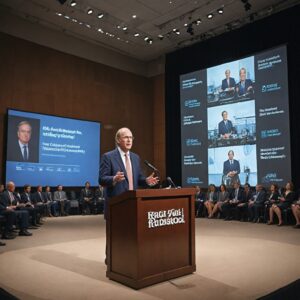Summary
Unlocking Potential: Elliott’s Impact on Global Payments Growth explores the transformative influence of Elliott Investment Management, a prominent activist hedge fund, on Global Payments Inc., a major player in the global payments processing industry. Following Global Payments’ $24.2 billion acquisition of Worldpay, the company faced investor skepticism amid post-merger integration challenges and a steep decline in share price to decade lows. Elliott’s strategic entry, marked by a significant equity stake and board-level involvement, has been widely seen as a catalyst for revitalizing investor confidence and accelerating operational improvements.
Elliott’s involvement is notable for its focus on governance reforms, including advocating for a reconstituted board with representatives to enhance management accountability and enforce a moratorium on further acquisitions. The firm promotes streamlining initiatives such as consolidating global IT systems—targeting over $200 million in annual cost savings—and divesting low-growth legacy assets to sharpen Global Payments’ focus on pure-play commerce solutions. These efforts align with the company’s strategic goal to leverage synergies from the Worldpay acquisition, expected to deliver $600 million in annual cost savings and $200 million in additional revenue, thereby driving sustainable growth in a highly competitive sector.
While Elliott’s activism has garnered cautious optimism, it also faces challenges and criticisms. Investor wariness persists due to prior failed consolidations in the payments industry and the inherent risks of executing complex turnarounds. Additionally, limited public disclosure from both Elliott and Global Payments has led to market uncertainty, and the complex compensation structures tied to Elliott’s advisory roles raise concerns about potential conflicts of interest. Despite these hurdles, recent financial results—including 5% constant currency revenue growth and $512 million in adjusted free cash flow reported in Q2 2025—underscore Global Payments’ operational resilience and the potential effectiveness of Elliott’s strategic interventions.
Overall, Elliott Management’s activist approach exemplifies a broader shift in shareholder engagement within the financial technology sector, combining deep strategic insight with hands-on governance to unlock value. Its influence on Global Payments highlights the evolving dynamics of corporate activism in driving transformation amid rapid industry consolidation and technological change.
Background
Global Payments, a leading provider in the payments processing industry, has undergone significant strategic shifts in recent years to streamline its business model. Notably, the company has focused on transforming into a pure-play commerce solutions provider, a move that management believes will generate substantial synergies, including $600 million in annual cost savings and $200 million in additional revenue. This strategic realignment comes amid a wave of consolidation in the payments sector, which has seen major deals such as Global Payments’ acquisition of TSYS and FIS’s purchase of Worldpay later face challenges and partial reversals, contributing to investor skepticism toward similar transactions.
Investor reaction to these developments has been mixed. After the announcement of a recent acquisition, Global Payments’ stock initially fell sharply, reaching a decade low with a 20% decline in April. However, the stock rebounded somewhat in subsequent weeks, reflecting a market valuation of approximately $19 billion. The situation shifted further when Elliott Management, a prominent activist investor, disclosed its stake in Global Payments, prompting a 5.4% rise in the company’s stock price during after-hours trading. Elliott’s involvement is seen as a key factor as Global Payments seeks to refine its focus on payment processing for businesses, with the activist investor’s influence potentially accelerating the company’s growth and strategic execution.
Elliott Investment Management
Elliott Investment Management L.P. is a prominent hedge fund known for its activist investment approach, managing discretionary assets totaling over $117 billion as of early 2025. With a client base of 38, Elliott has built a reputation for taking significant positions in various companies, including iShares Russell 1000 Value ETF, Cisco Systems, Equinix, and Triple Flag Precious Metals Corp, which is its largest holding with over 133 million shares.
Historically, Elliott gained recognition as a strategic activist primarily within the technology sector, leveraging its influence to orchestrate company sales or acquisitions that generated substantial returns. Over the past two decades, the firm has expanded its activist focus beyond technology, adopting a more comprehensive approach that spans different sectors and geographies. This broader strategy often involves governance-oriented activism, where Elliott seeks to effect change at the board level. By placing representatives on company boards, the firm aims to restore investor confidence and drive successful integrations and long-term value creation, as exemplified in its involvement with Worldpay and Global Payments.
Elliott’s activist methodology combines deep strategic insight with hands-on governance engagement, positioning the fund as a key player in influencing corporate trajectories and unlocking shareholder value across diverse industries.
Elliott’s Involvement in the Global Payments Sector
Elliott Investment Management, a prominent activist investor, has acquired a significant stake in Global Payments, signaling a strategic move to influence the company’s direction amid a challenging post-merger environment. This involvement follows Global Payments’ $24.2 billion acquisition of Worldpay, which initially led to a sharp decline in the company’s share price, reaching its lowest level in a decade before partially recovering.
Elliott’s entry is widely perceived as an effort to revitalize investor confidence and drive operational improvements within Global Payments. The firm is known for its activism strategy, which involves actively engaging with underperforming companies to unlock shareholder value through strategic changes, boardroom restructuring, and governance reforms. In the case of Global Payments, Elliott’s influence is expected to help the company streamline its global IT systems—targeting annual savings of over $200 million—and consolidate regional offices to enhance operational efficiency.
Furthermore, Elliott may advocate for divesting low-growth legacy assets, such as payment terminals and regional merchant acquiring operations, to sharpen the company’s focus on its core business of processing payments for enterprises. This focus aligns with Global Payments’ goal to simplify its business model into a pure-play commerce solutions provider, leveraging synergies projected from the Worldpay acquisition, including $600 million in annual cost savings and $200 million in revenue enhancements.
Investor skepticism remains, partly due to prior setbacks in large-scale payment industry consolidations. However, Elliott’s reputation for enforcing management accountability and its ability to add experienced board members skilled in managing integrations may help restore confidence and drive value creation. Recent financial results underscore Global Payments’ potential, with the company reporting $512 million in adjusted free cash flow and a 5% constant currency revenue growth in Q2 2025, indicating resilience amid the ongoing restructuring efforts.
Impact on Global Payments Growth
Elliott Management’s involvement with Global Payments has been widely seen as a catalyst for enhanced execution and increased credibility within the company. By advocating for a reconstituted board that holds management accountable and commits to an M&A moratorium, Elliott aims to restore investor confidence, which had waned after recent turbulent deals in the payments sector. The hedge fund’s experience in pushing strategic changes, as demonstrated in past investments like Allied Capital and Marathon Petroleum, underlines its potential to drive meaningful operational improvements at Global Payments.
Following the disclosure of Elliott’s stake, Global Payments’ stock experienced a 5.4% increase in after-hours trading, signaling positive investor reception to the activist investor’s involvement despite earlier negative reactions to the Worldpay acquisition that had driven the stock to a decade-low. While the specifics of Elliott’s demands remain undisclosed, expectations center around strategic realignment and operational efficiency aimed at stabilizing the company’s market position and restoring shareholder confidence.
Operationally, Global Payments shows signs of resilience, with 5% constant currency revenue growth reported in Q2 2025 and adjusted free cash flow of $512 million, indicating the potential for margin expansion and cost optimization. Elliott is likely to push for streamlining initiatives such as consolidating global IT systems, which could yield over $200 million in annual savings, and divesting non-core assets like payment terminals and regional merchant acquiring businesses to further improve profitability. These measures, coupled with possible asset sales and buybacks funded by divestitures, could unlock significant value and fuel the company’s growth trajectory in the competitive payments landscape.
Strategic Initiatives Promoted by Elliott
Elliott Management is recognized for its activist investment strategy, which involves actively engaging with underperforming companies to unlock shareholder value by advocating for strategic changes, boardroom reshuffles, and corporate governance reforms. In the case of Global Payments, Elliott’s involvement reflects its evolved, broader activist approach that emphasizes influence at the board level to restore investor confidence and enhance execution capabilities.
One of Elliott’s key initiatives with Global Payments includes advocating for a reconstituted board that incorporates Elliott representatives. This move is intended to improve oversight by holding management accountable, committing to an M&A moratorium, and adding members with experience in integrating large acquisitions, thereby increasing the likelihood of successful strategic execution and operational improvements. Elliott views such governance changes as essential to stabilizing the company amid skepticism following recent payment industry consolidations and unwound deals.
Operational efficiency forms a critical component of Elliott’s strategic agenda. This includes pushing for the streamlining of global IT systems, targeting over $200 million in annual savings, and consolidating regional offices to reduce overhead costs. The firm’s confidence in these initiatives is supported by Global Payments’ Q2 2025 results, which demonstrated $512 million in adjusted free cash flow, indicating that operational improvements are achievable with decisive leadership action.
Additionally, Elliott encourages divestiture of low-growth, non-core legacy assets such as payment terminals and regional merchant acquiring operations, aiming to refocus Global Payments on higher-growth, scalable commerce solutions. These moves align with the broader industry trend toward leveraging technology-driven financial services that provide more accessible, cost-effective, and transparent alternatives to traditional financial institutions.
Collectively, Elliott’s strategic initiatives for Global Payments are designed to drive sustainable value creation by enhancing governance, improving operational efficiency, and refining the company’s business model to better capture growth opportunities in the evolving payments landscape.
Broader Influence and Indirect Involvement
Elliott Management exerts its influence on Global Payments not only through direct shareholder activism but also via a network of Trading Consultants, Senior Advisers, and Operating Executives. These individuals are engaged under various arrangements—ranging from one-off and short-term to long-term and full-time engagements—and receive compensation through multiple channels, including cash retainers, bonuses, fees, profits interests, co-investment opportunities, and participation in management equity plans. Their remuneration may be sourced from the Funds, other advisory clients, portfolio investments, or occasionally through reimbursements from Elliott itself.
This layered involvement enables Elliott to maintain a degree of flexibility and depth in influencing Global Payments’ strategic direction and operational execution. While the activist hedge fund is known for its direct engagement with management teams and boards to drive changes in corporate strategy, governance, and capital allocation, these ancillary advisers enhance its capacity to support companies with execution challenges and credibility issues. In the context of Global Payments, such support is crucial given the company’s focus on simplifying its business model toward pure-play commerce solutions and the significant cost and revenue synergies anticipated from recent mergers.
Furthermore, Elliott’s involvement is part of a broader strategy that leverages both direct activism and indirect advisory roles, contributing to a comprehensive approach to unlocking value in its portfolio companies. This multi-faceted influence extends beyond immediate shareholder activism, providing digital access and exclusive content features to organizations within its network, thereby fostering an ecosystem that supports long-term value creation. Although representatives of both Global Payments and Elliott have declined to comment on specific engagements, the complexity and breadth of Elliott’s involvement illustrate its sophisticated approach to activist investment and corporate influence.
Challenges and Criticisms
Elliott Management’s involvement with Global Payments (GPN) has been met with both cautious optimism and skepticism due to the high-risk nature of activist investing in this context. One of the primary challenges stems from execution and regulatory uncertainties surrounding the activist play. While Elliott’s strategy aims to unlock value by encouraging GPN to shed non-core assets, cut costs, and refocus on growth, there remains a significant risk of missteps in this prolonged turnaround effort, which could negatively impact investor returns.
Investors have also expressed wariness towards large-scale deals in the payments sector, given the recent history of unwound mergers involving major players. For instance, two of the three largest consolidation deals in 2019—Global Payments’ acquisition of TSYS and FIS’s acquisition of Worldpay—have since been reversed. This track record has made investors skeptical of new transactions of a similar nature. Nevertheless, some analysts believe that the potential failure is already priced into the market, and management maintains that the Worldpay acquisition strategically simplifies Global Payments’ business model into a pure-play commerce solutions provider, while promising substantial cost and revenue synergies.
Moreover, Elliott’s activist approach, which has historically focused on strategic interventions primarily in the technology sector, has evolved to include a broader governance-oriented activism that often involves board-level involvement. Although this approach has yielded success in many instances, it also requires a delicate balance in steering companies without overstepping, which can lead to tensions with existing management and stakeholders.
Communication challenges have also arisen, as representatives from both Global Payments and Elliott have been reticent to provide detailed public commentary on their strategies and ongoing negotiations. This lack of transparency has occasionally fueled speculation and uncertainty in the market.
Finally, the compensation structure for Elliott Management’s funds and advisory clients, which includes reimbursement arrangements, highlights the complex financial interests at play. While the primary objective is to generate high returns and minimize losses, the broad and aggressive trading mandates increase exposure to market volatility and potential conflicts of interest.
Future Prospects and Potential Developments
Global Payments (GPN) faces a pivotal phase marked by the involvement of Elliott Management, whose entry is viewed as a catalyst for the company’s revival and strategic refocusing. Following GPN’s challenging post-merger period, particularly after the $24.2 billion acquisition of Worldpay, the company has shown signs of resilience with a 5% constant currency revenue growth in Q2 2025, indicating underlying operational strength. Elliott’s activist approach is expected to drive further gains through targeted margin expansion, asset sales, and share buybacks funded by divestitures.
A significant avenue for improvement lies in operational efficiency. GPN aims to streamline its global IT systems, targeting over $200 million in annual savings, alongside consolidating regional offices to reduce costs. The company’s Q2 2025 adjusted free cash flow of $512 million reflects the feasibility of these efficiency measures if leadership commits to decisive actions. Additionally, Elliott is likely to advocate for divesting non-core, low-growth legacy businesses such as payment terminals and regional merchant acquiring operations, thereby sharpening GPN’s focus on core commerce solutions.
Strategically, GPN’s management maintains that the Worldpay transaction, despite initial market skepticism rooted in previous failed consolidations within the payments sector, aligns with a clear vision to simplify the business model into a pure-play commerce solutions provider. This realignment is expected to yield substantial synergies, including $600 million in annual cost savings and $200 million in revenue enhancements. Elliott’s historical expertise in governance-oriented activism and its broadening focus beyond technology into diverse sectors positions it to contribute significantly to GPN’s board-level value creation, potentially steering the company toward sustainable growth.


























